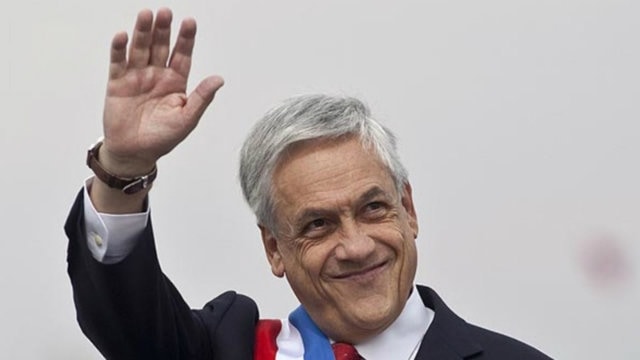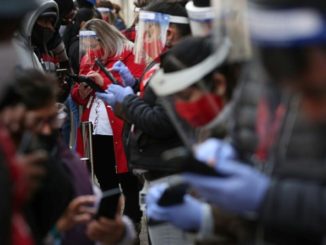
SANTIAGO – The billionaire conservative Sebastián Piñera will take office today, March 11, as president of Chile, replacing socialist Michelle Bachelet at the end of her second non-consecutive term.
A ceremony is scheduled in Valparaíso for 12 noon and will be attended by Brazil’s President Michel Temer, among other Latin presidents. This is the second time that Bachelet passes the presidential track to Piñera, who already ruled Chile between 2010 and 2014.
When she took office for a second time in 2014, Argentina and Brazil were governed by leftist women: Cristina Fernández de Kirchner and Dilma Rousseff. But after Sunday, all the countries in the Americas will be run by men.

Confirmed attendees include Maurici Macri of Argentina, Enrique Peña Nieto of Mexico, Pedro Pablo Kuczynski of Peru, and Lenin Moreno of Ecuador. After the ceremony, Piñera must go to Cerro Castillo to have lunch with his guests and then travel to the capital Santiago, where he will deliver his first speech as president.
Piñera, who has been president between 2010 and 2014, must face the challenge of governing with a divided Congress and the pressure of social movements that want to deepen the reforms that the first woman elected president in Chile left unfinished.
Piñera won the second round of the December presidential election, defeating center-left opponent Alejandro Guillier. His victory is seen as the last example of the advance of the right in Latin America.
Bachelet ends her second term with 30% popularity, well below the 80% recorded at the end of her first administration, amid divided opinions on the scope of her reforms.
“I feel like I walk out the front door, because although we wanted to do some things faster or better, I feel proud of what we did,” the outgoing president said last week.
Ahora: La Pdta. @mbachelet llega a La Moneda y la Guardia de Palacio le rinde honores por última vez. #CambioDeMando pic.twitter.com/eUZQDYs7fM
— Prensa Presidencia (@presidencia_cl) March 11, 2018
In her last days as president, Bachelet signed and sent to Congress a reform bill that proposes a new Constitution for the country – an old aspiration of the parliamentarians of the left and the center with which Piñera will have to govern.
In January, Piñera announced the members of his cabinet, which has been criticized by some parties for having a marked economic aspect.
His cabinet will be composed of seven women ministers, including Cecilia Pérez, in charge of the Secretary General of Government, and 16 ministers, among them men of extreme confidence in key positions. Six members of his new cabinet had already been ministers in his first cabinet. Five are from the National Renewal Party (RN), which represents sectors of the traditional Chilean right.
Sebastián Piñera unveils his team of undersecretaries (VIDEO)
One of Piñera’s old acquaintances is the renowned economist Felipe Larraín, appointed to once again occupy the Ministry of Finance.
Rise of Piñera
Born in Santiago in 1949 into a middle-class family, Sebastián was the third of five children of Magdalena Echenique and José Piñera, an engineer and diplomat who participated in the founding of Christian Democracy.
Piñera has a degree in Commercial Engineering from the Universidad Católica de Chile and a Masters and PhD in Economics from Harvard University, where he also served as an assistant professor. He also taught at Chilean universities.
He was a consultant with the Inter-American Development Bank (IDB), the World Bank, and worked for the Economic Commission for Latin America and the Caribbean (ECLAC).
In the 1970s Piñera founded his first company, the Toltén construction company, which was later sold for $ 2 million, according to the newspaper El Mercurio. In 1978 the businessman managed to represent Chile in Visa and Mastercard credit cards and then created Bancard.
He was the general manager of banks Talca and Citicorp-Chile, Apple’s Chilean president and shareholder of some companies, among them Lan Chile (now Latam, after the merger with the Brazilian TAM). In 2004, he bought TV Chilevisión and was the largest shareholder of the parent company of the Colo-Colo football team.
Piñera joined the political career in 1990, when he was elected senator and, after being elected with an independent candidacy, joined the National Renovation party. In 1993, the party considered him to launch as presidential candidate, which did not happen because of the scandal known as “Piñeragate”. In it, Piñera was caught in wiretaps asking him to be privileged in a debate.

He was presidential candidate in 2005, after presiding the party between 2001 and 2004, but lost in the second round to Michelle Bachelet with 46.5% of the votes. In 2009 he was again presidential candidate, being elected the following year with 51.61% of the votes against former president Eduardo Frei.
Mr. Piñera was the first right-wing leader elected since democracy was restored in Chile in 1990, after a 17-year military dictatorship led by Gen. Augusto Pinochet.



